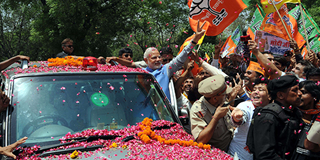Unless India's new prime minister, Narendra Modi, can deliver socially inclusive growth, his sweeping electoral triumph will prove short-lived. In that sense, his victory is the strongest possible proof that the consensus dating to India’s first prime minister, the democratic socialist Jawaharlal Nehru, remains firmly in place.
NEW DELHI – The victory of the Bharatiya Janata Party and its leader, Narendra Modi, in India’s general election last month has raised a crucial question about the country’s future. With the BJP sweeping to power on a platform of aggressive nationalism and business-friendly corporatism, has the socioeconomic consensus dating to India’s first prime minister, the democratic socialist Jawaharlal Nehru, come to an end?
The “Nehruvian consensus” facilitated India’s democratic maturation and accommodated the country’s many diverse interests, without permitting any one group or section to dominate the nascent nation-state. It is fashionable today to decry Nehruvian socialism as a corrupt and inefficient system that condemned India to many years of slow economic growth. But at its core was the conviction that in a land of extreme poverty and inequality, the objective of government policy must be to improve the welfare of the poorest, most deprived, and most marginalized.
In Nehru’s day, the best way to accomplish that was by building up structures of public ownership and state control of resources, as well as by boosting economic capacity through government intervention. Of course, Nehru’s economic vision had its flaws, giving rise, for example, to the so-called “license-permit-quota Raj,” under which government control stifled entrepreneurial activity, which in turn held growth rates below those of India’s Southeast Asian neighbors.

NEW DELHI – The victory of the Bharatiya Janata Party and its leader, Narendra Modi, in India’s general election last month has raised a crucial question about the country’s future. With the BJP sweeping to power on a platform of aggressive nationalism and business-friendly corporatism, has the socioeconomic consensus dating to India’s first prime minister, the democratic socialist Jawaharlal Nehru, come to an end?
The “Nehruvian consensus” facilitated India’s democratic maturation and accommodated the country’s many diverse interests, without permitting any one group or section to dominate the nascent nation-state. It is fashionable today to decry Nehruvian socialism as a corrupt and inefficient system that condemned India to many years of slow economic growth. But at its core was the conviction that in a land of extreme poverty and inequality, the objective of government policy must be to improve the welfare of the poorest, most deprived, and most marginalized.
In Nehru’s day, the best way to accomplish that was by building up structures of public ownership and state control of resources, as well as by boosting economic capacity through government intervention. Of course, Nehru’s economic vision had its flaws, giving rise, for example, to the so-called “license-permit-quota Raj,” under which government control stifled entrepreneurial activity, which in turn held growth rates below those of India’s Southeast Asian neighbors.